
The King's Police Medal (KPM) is awarded to police in the United Kingdom for gallantry or distinguished service. It was also formerly awarded within the wider British Empire, including Commonwealth countries, most of which now have their own honours systems. The medal was established on 7 July 1909, initially inspired by the need to recognise the gallantry of the police officers involved in the Tottenham Outrage. Renamed the King's Police and Fire Services Medal (KPFSM) in 1940, it was replaced on 19 May 1954 by the Queen's Police Medal (QPM), when a separate Queen's Fire Service Medal was also instituted. The current award was renamed the King's Police Medal following the death of Queen Elizabeth II in 2022 and the accession of King Charles III to the throne of the United Kingdom.
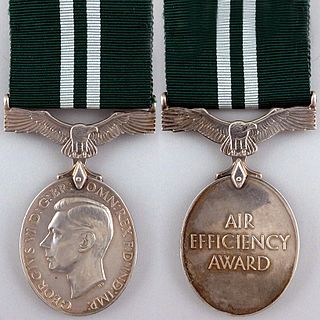
The Air Efficiency Award, post-nominal letters AE for officers, was instituted in 1942. It could be awarded after ten years of meritorious service to officers, airmen and airwomen in the Auxiliary and Volunteer Air Forces of the United Kingdom and the Territorial Air Forces and Air Force Reserves of the Dominions, the Indian Empire, Burma, the Colonies and Protectorates.
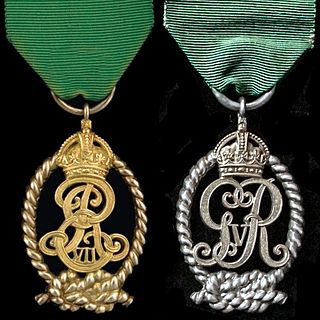
The Decoration for Officers of the Royal Naval Volunteer Reserve, post-nominal letters VD until c. 1947 and VRD thereafter, was instituted in 1908. It could be awarded to part-time commissioned officers in the United Kingdom's Royal Naval Volunteer Reserve after twenty years of service as efficient and thoroughly capable officers. The decoration was a Naval version of the Volunteer Officers' Decoration and its successor, the Territorial Decoration.
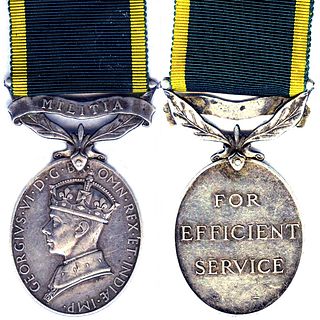
The Efficiency Medal was instituted in 1930 for award to part-time warrant officers, non-commissioned officers and men after twelve years of efficient service on the active list of the Militia or the Territorial Army of the United Kingdom, or of the other Auxiliary Military Forces throughout the British Empire. At the same time a clasp was instituted for award to holders of the medal upon completion of further periods of six years of efficient service.
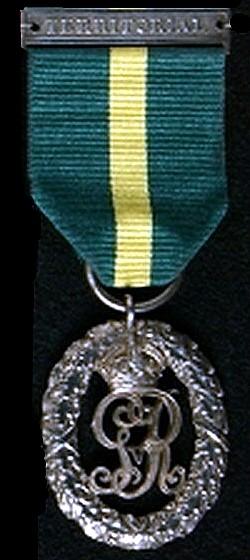
The Efficiency Decoration, post-nominal letters TD for recipients serving in the Territorial Army of the United Kingdom or ED for those serving in the Auxiliary Military Forces, was instituted in 1930 for award to part-time officers after twenty years of service as an efficient and thoroughly capable officer. The decoration superseded the Volunteer Officers' Decoration, the Colonial Auxiliary Forces Officers' Decoration and the Territorial Decoration.
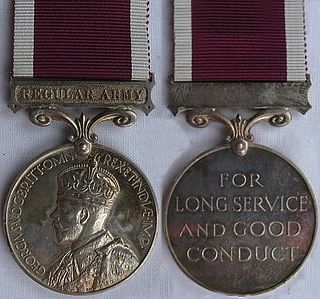
The Medal for Long Service and Good Conduct (Military) is a medal awarded to regular members of the armed forces. It was instituted by King George V in 1930 and replaced the Army Long Service and Good Conduct Medal as well as the Permanent Forces of the Empire Beyond the Seas Medal. The medal was originally awarded to Regular Army warrant officers, non-commissioned officers and men of the UK Armed Forces. It also had a number of territorial versions for the Permanent Forces of the British Dominions. The eligibility criteria were relaxed in 1947 to also allow the award of the medal to officers who had served a minimum period in the ranks before being commissioned. Since 2016, the eligibility was widened to include officers who had never served in the ranks, and so the medal can now be awarded to all regular members of the British Armed Forces who meet the required length of service.
The Overseas Territories Police Medal (OTPM), known as the Colonial Police Medal (CPM) until April 2012, is a medal awarded for gallantry or distinguished service to all ranks of police forces and organised fire brigades in British Overseas Territories, and formerly in Crown Colonies and British Dependent Territories. Police officers in these areas can also be awarded the higher ranking King's Police Medal. The CPM was first awarded in 1938.

The Efficiency Medal (South Africa) was instituted in 1930 for award to part-time warrant officers, non-commissioned officers and men after twelve years of efficient service on the active list of the Citizen Force of the Union of South Africa. At the same time, a clasp was instituted for award to holders of the medal upon completion of further periods of six years of efficient service. The medal superseded the Colonial Auxiliary Forces Long Service Medal.
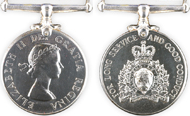
The Royal Canadian Mounted Police Long Service Medal was established by royal warrant on 6 March 1934 by King George V. It is the oldest continually awarded honour within the Canadian honours system, and the first created specifically for Canadian service within Canada. Initially proposed by the Royal North-West Mounted Police Veterans’ Association, it took more than ten years for the proposal to be realized. The determination of the veterans was aided by the interest of Commissioner Cortlandt Starnes and Prime Minister R.B. Bennett.

The Royal Naval Volunteer Reserve Long Service and Good Conduct Medal, initially designated the Royal Naval Volunteer Reserve Long Service Medal, was instituted in 1908. It could be awarded to part-time ratings in the United Kingdom's Royal Naval Volunteer Reserve after twelve years of service and good conduct. The medal was a Naval version of the Volunteer Long Service Medal and its successor, the Territorial Force Efficiency Medal.

The Colonial Police Long Service Medal was established in 1934 to recognise long service in the police forces of the colonies and overseas territories of the United Kingdom. On 10 April 2012 the medal became known as the Overseas Territories Police Long Service Medal.

The Colonial Prison Service Medal was established on 28 October 1955 as a long service medal of the United Kingdom and the Commonwealth. On 10 April 2012 the medal became known as the Overseas Territories Prison Service Medal, and underwent a minor change in design. This reflected the change in the way Britain's remaining colonies were described, they having been classed as 'Overseas Territories' from 2002.

The Colonial Fire Brigades Long Service Medal, now known as the Overseas Territories Fire Brigades Long Service Medal, was established in 1934 to recognise long service in the fire services of the colonies and overseas territories of the United Kingdom.

In May 1895, Queen Victoria authorised Colonial governments to adopt various British military medals and to award them to their local military forces. The Cape of Good Hope introduced this system in September 1895 and, in 1896, instituted the Army Long Service and Good Conduct Medal (Cape of Good Hope).
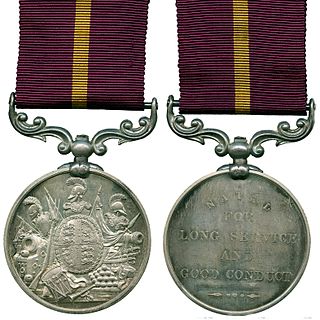
In May 1895, Queen Victoria authorised Colonial governments to adopt various British military medals and to award them to their local military forces. The Colony of Natal introduced this system in August 1895 and, in 1897, instituted the Army Long Service and Good Conduct Medal (Natal).

The Royal Air Force Long Service and Good Conduct Medal is a medal awarded to regular members of the Royal Air Force in recognition of long service. It was instituted by King George V in 1919, the year following the establishment of the world's first independent air force. At first, the medal was awarded to Regular Force non-commissioned officers and airmen of the Royal Air Force. The award criteria were later relaxed to also allow the award of the medal to officers who had served a minimum period in the ranks before being commissioned. Since 2016, it is awarded to all regular members of the RAF, including officers who had never served in the ranks.

A number of new Sierra Leonean medals were instituted in the decade from 1961, when the country gained independence, until 1971, when Sierra Leone was declared a republic.

The Mauritius Police Long Service and Good Conduct Medal was awarded by the Dominion of Mauritius between 1968 and 1992 to members of the Mauritius Police who completed eighteen years service.

The Mauritius Prisons Service Long Service and Good Conduct Medal was awarded by the Dominion of Mauritius between 1968 and 1992 to staff of the Mauritius Prisons Service who completed eighteen years service.
The Central Chancery of the Orders of Knighthood has, at irregular intervals, notified for general information the positioning of the wearing of Orders, decorations, and medals of the United Kingdom in the London Gazette. The Order of Wear was last published in 2019.
















